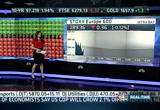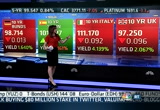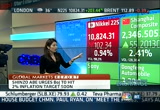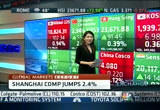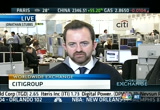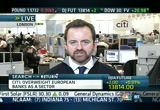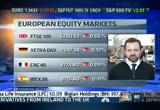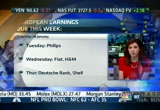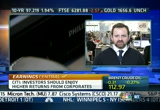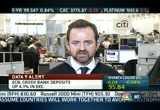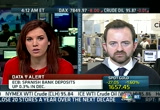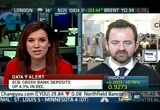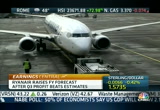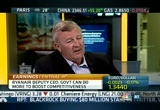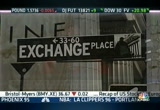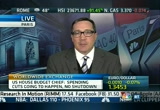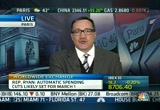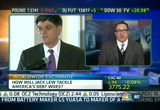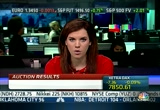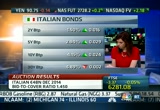tv Worldwide Exchange CNBC January 28, 2013 4:00am-6:00am EST
4:01 am
welcome to today's "worldwide exchange" 37 i'm kelly evans and these are your headlines from around the world. a state of emergency declared in egypt after riots in the biggest cities along the suez canal. the dow is now set to post its best january in more than 20 years. shares rise after the central bank approve the second bailout
4:02 am
as politicians make accusations over the failed lender. 52% of those surveyed would prefer the uk to leave the euro. >> i should have said leave the european union. britain can't leave that monetary issue. we'll have plenty more on the relationship between britain and europe. for now, we can look at the relationship with markets. the euro stoxx 6700 is down about 0.4% today. not a done of differentiation. the biggest gainer, interestingly, is monti paschi. some of the airlines are struggling, too, on the back of ryan air's results.
4:03 am
now take a look at what's happening across the bourses. we're seeing somewhat again of a trading pattern here after the last several trading sessions where it's not consistent. we'll get those up for you just as soon as we can. today, it's down pretty much across the board. the ibex shedding 0.12%. the cac 400.15% the. the xetra dax is also down 0.1%. the ftse 1100, same thing. pretty consistent story across these indexes here. it's a big week for earnings, too. in the meantime, let's take a look at the bond wall. it's been interesting, actually, to see the lack of action, lack of attention markets have been paying here lately. over here, gilts are holding above the 2% level. interesting to look at whether that relationship gap between gilts and trishrys will hold. 4.1% in italy. there will be a couple of italian debt auctions later this morning.
4:04 am
spain, 5.16% is the level there. bunds, 1.63%, so we have seen them move out a little bit. in the u.s., earnings will include exxon. nymex and brent are down this morning. nymex by 0.1%. brent by 0.4%. great stories and illustration in the "financial times" today talking about shale burn as more of that sail oil production has increased. but gas outflows are big. you can see them the way you might see the city of minneapolis and the city of chicago. that's raising plenty of questions. over here, gold is continuing to sell off, down 1.6%. it's been under pressure for the last couple of weeks as growth prospects around the world have actually started to perk up a little bit. copper, though, is just fractionally lower, too. so it's different, perhaps, than what's happening with global demand. quick check off forex, we know the sterling has been weaker,
4:05 am
but now another 0.4% against the dollars. 1.57 is the level there. it was shortly a go above 1.60. australian dollar, weaker, too. the dollar/yen, down by 0.3%. the euro/dollar down by 0.25%. 90.63 is the level here to watch, one of the biggest stories on for ex. let's get straight out to li sixuan who joins us now from singapore. >> thank you, kelly. a lot of focus was on japan today. shinzo abe used his first policy speech to high lie the importance for the boj to reach the 2% inflation target after new cabinets raised the country's growth outlook from 2.5% from april. but the nikkei saw some profit taking after touching a fresh 32-month high. caution over domestic earnings weighed on sentiment.
4:06 am
toyota didn't get a let, but sony shared dumped 9% after citigroup raised the country's ratings to a buy from neutral. but look at the shanghai composite, a 2.4% jump. this after data shows processing, industrial companies climbed more than 17% in december from a year ago. brokerages rallied after the shanghai and shenzhen bourses said they were nearly double the scale for margin trading. vol vo agreed to buy a 45% stake in its commercial vehicle unit. meanwhile, shares in hong kong gained a modest 0.4%. but china's costco's h share split about 5% after after the shipping giant warned a second straight year of significant loss due to freight rates. the kospi extended it's four-day losing streak. automakers dragged tin decks
4:07 am
low. australia's asx 200 is out for a public holiday. india's sensex is currently trading along the flat line. now back to you, kelly. >> thank you for that. we want to turn our attention to asia. jonathan stubb joins me now. good morning. >> good morning. >> you've got the pullover look going, the zip up look. i like it. i just want to talk a little bit about equities broadly. is one of the real questions coming into this year after the run up we've seen in european stocks this year, how much further can we go here? >> looking in the medium term of the next two years, we're looking at 25% to 30% returns which sounds like a lot. base odd assumptions of modest earnings. the medium outlook looks good for markets.
4:08 am
we are cautioned about running very aggressively with this swiss rally in the near term. >> i want to get into earnings in just a second. you mentioned three factors here. on the valuation side, we know we've seen the multiple at near year highs, but how much further could we go on that front? >> there's two main points here. last year, we saw a rerating and a no earnings rate in europe. unfortunately it was driven by a reduction in risk premium thanks to policy reduction rather than risk pick up appetite. we think that happens from here on in. one of the key dynamics here is a change in corporate interest rates. so when you look at the triple b bond yields, they were 12% three months ago and they're now 3%. we would just expect to see some releveraging from the corporate sector here. >> that is a great point. >> the second point briefly,
4:09 am
equities are cheap now against credits. we mirror image on the late '90s. equities look relative value great terms 37. >> what's happening on the credits side than what's going on with equities given the rally? what we've seen and what you're suggesting is not necessarily a great rotation from credit into equities, but almost if they both continue to rally together. >> yeah. i mean, credit has rallied very hard. we see sort of some upside in credit over the course of this year. but equities look like a better risk/reward trade especially over this period in time. and they mirror the expensive levels of equities in the late '90s. we know what happened then. we're advising our investors to look at the trade because of the equity market of the next couple of years. >> we're just showing this morning we are kicking off the week with most of the major
4:10 am
bourses down, down by 0.1%. do you like europe broadly? or how would you prefer to play this market? >> we've seen strong leadership within the market over two or three years. we think that broadly continues. but what is interesting, i think, about this year is that the opportunity, individual stock return opportunities are much more by corporate action. to the balance sheet, releverage or not, also by restructuring, as well. restructuring for us is a very good bottom up. it's one of the key drivers of performance this year. our key message is to be selective within europe. that's both at a country level and at a sector level back both countries where you can see growth being delivered. >> you mentioned earnings, one of the tenants of your call here. philips electronics will kick off fourth quarter results tomorrow morning. other heavyweight these week include fiat, h&m, do you have ya bank and shell on thursday.
4:11 am
jonathan, on that front, earnings here, any reason to be concerned? because if anything, this being most ties to let's say nominal gdp or growth across europe which we know is extremely weak, what is priced in at this point? >> well, i mean, one of the interesting things is if you follow earnings over the last six months, we've seen 38 consecutive weeks of earnings downgrade. you would have been pointed to the way share prices move. earnings haven't been a great guide over the last six months. i think at this stage in the cycle with nominal gdp growth, globally running at an average level, it's quite hard for the corporate sector to meaningfully disappoint what's out there in the market. i think selectively in industries where you have high cap ex and low prospect abilities, utilities, come ex, you're at risk of seeing disappointment.
4:12 am
maybe the banks selectively in europe is maybe sustained some up side surprise, cost cutting and maybe improve capital divisions. >> it's interesting because in the u.s., i think it's something like 40% of the s&p revenues, maybe profits, too, come from overs overseas. what's the share in europe? you mentioned, again, that it's not just the story about what's happening with the domestic economy. >> yeah. rates probably close to 50% in europe. europe obviously is a collection of smaller companies. if you're historically in those countries you've had to reach out much sooner than american companies have. they're global leaders in their industry around the world. they just happen to be based here in europe and one of our key messages of the last four years has been buy european countries and make sure they have as little exposure as possible. that's generally the message. there's more competition in the market now even from peripheral countries benefiting in the risk rally. >> i wonder about philips, too,
4:13 am
reporting tomorrow. are they seen similar to alcoa as the barometer? >> i think, you know, any big company which comes out and meaningfully beats or disappoints the market, european equities are up .25% from the lows in the summer. it could be any number of big stocks which sets the near term direction of the market. overall, it's very unlikely. the corporate sector has within its power to greatly disappoint or please the markets as we go through the next few weeks. i think politicians are a much greater risk, both up side and down side given the events coming up in italy. >> that's often what you'll hear is still about these events. but between the general market sentiment being so bullish on equities, i have to say almost globally the sense that they're overbought, that they're liked too much, that there needs to be
4:14 am
a healthy correction and that maybe politics is the catalyst for that. >> it may well be. the pain trade, hardly any capital has been allocated in the markets the last five to seven years. capitals have been allocated on a capital protection basis rather than any attempt to protect inflation or to generate capital returns. so there's a huge potential for capital to come back for equities. we think that happens slowly. any risk factor out there, whether it's politics, whether it's macro, can this market buy sense in the quarter. that's one reason why perhaps they've struggled to go down that much. >> two final questions. first, how is european equities earnings season generally going to go and, second, where is the stoxx 600 for the year? >> we think the stoxx 600 tends to head higher. how much is the question of how
4:15 am
much money comes into the market between now and then. it's quite easy to see the market up some 5%, 10% levels. earnings season will be down generally. you have to be selective. i think i'd be looking elsewhere for the market direction over the next six months rather than earnings season, to be honest. >> all right. jonathan, thanks very much. >> thank you. speaking of earnings, ryan air has raised its full year forecast after a surprise third quarter profit. the budget carrier said average fathers for the traditionally weak period did rise 8%. but speaking to "squawk box" earlier, the company's ceo michael culley was not as optimistic on growth going forward. >> the awkward surprise in these results with the strong yield from october to december. and we're not really experiencing the same surprise in this quarter.
4:16 am
we're doing well, but we're not doing as surprisingly well as we did in the third quarter. >> he also weighed in on the irish government's efforts to boost its economy, saying progress was being made, but insisted more could be done. >> the government has not necessarily addressed all the issues. they've done well and they've certainly addressed certain aspects of the cost space within ireland. but for those companies, particularly retailers, we're operating within the irish domestic market exclusively, it's a very, very different environment with awkward rent reviews, public sector costs are highly uncompetitive right across costs such as wages. other local authority charges on retailers in particular and those with large industrial premises within the country and we also have a domestic mortgage crisis with the banks. >> now, ryanair shares are under pressure today. you can see they're trading down
4:17 am
by better than 2%, in fact, taking the sector down, too. ez-jet is one of the worst performers on the stoxx 600 today. ryanair is roughly flat over the past seven days, so marginally higher from where we were a week ago on the back of those comments. we are going to head out to tokyo as toyota reclaims the crown from gm as the world's biggest carmaker. we'll get the latest from egypt as president morsi declares a month-long state of emergency. dozens of people have been killed over anti-government protests. we'll take a view on equities, too. the dow, as we said, is on pace for its best january since 1989. and, again, for that backdrop, blackrock is reportedly buying an $80 million stake in twitter, snapping up shares early from employees looking to liquidate their stock options.
4:18 am
that is up from a report 8.4 billion in late 2011 when saudi prince amalied invested in the country. is twitter is bargain here if it's going to be the next facebook, maybe, for better or worse. what price would you put twitter at? join in the conversation, e-mail us or tweet us. now, coming up, is central bank independence a myth? our next guest has some strong opinions. we'll be right back.
4:21 am
welcome back to the program. a state of emergency has been called in dozes of egyptian cities where protests have been going on. >> egypt's morsi delivered a stern warnings in an address to the nation. on one hand, he issued a state of emergency for some of the cities that have seen the toughest fighting since clashes began. he also imposed a curfew for the residents of those cities. now, he also warned that the government would use all force necessary to try and restore
4:22 am
security, including deploying the military as they've already done in the cities of suez and port saied. thousands of people turned up today to bury the dead, including at least 30 people that were killed in deadly clashes with the police on saturday. on the same front, though, the president is facing a political crisis with members of the leading opposition. he has invited members of the national salvation front and other notable politicians and independent politicians here to the presidential palace on monday to hold emergency crisis talks to try and find a way out of these crises. but for protesters on the street, their demands are simple. president morsi must step down and there is no indication that president morsi is going so be meeting any of those demands anytime soon. he still enjoys a great deal of popularity. so this country is as polar eiz
4:23 am
and divided as it has been. >> we'll have plenty more events on the conflict out of egypt at about 10:40 central time. don't miss that. turning to japan, shinzo abe is wasting no time in putting pressure on the boj to raise its inflation goal. abe says the central bank needs to hit the target asap. that is up from the earlier 177 projection last summer. it's expecting heavy monetary and fiscal stimulus to spark domestic demands. meanwhile, in south korea, a bank of korea policymaker is sounding the alarm over the rash of quantitative easing in japan and other countries. suun kung is, yes, in a renewed currency war. many are citing the world of political independence and rising political pressure as a
4:24 am
factor behind qe around the world. joining us now, luca dixon. thank you very much for being with us. the whole debate about central bank independence, i wonder if it isn't a little bit off the mark. are we talking about independence or are we talking about central banks acting in isolation? because those are two very different things. >> yeah, exactly. this is exactly a very, very true and it's important to point to the difference of the two. the fist, what we mean by generally by central bank independence is some kind of central bank sticking to their target, to their own target, their own belief that citing inflation or as in the case of japan welcoming inflation is the best solution or the best contribution that the central bank can give. what, in fact, independence is central bank not taking the queues from government leaders.
4:25 am
i think in this second rotation, not taking the queues from government leaders, then the independence is pretty widespread. so there is real independence. however, there is a misled opinion that central banks will stick to their targets no matter what and this is just common sense. you know, in the last four years, we have seen central banks acting in order to prevent financial instability and i think this is what central banks should do, even when this prevention of physical instability goes beyond their targets. >> what's interesting is basically what we're saying is that if a central bank says in order to achieve my targeted goal i have to work together with the fiscal authorities, that's frankly an exercise of independence. you're deciding this is the best way to introduce policy. is that too naive an interpretation, luca? >> no, no, that's a perfect interpretation. the threshold is very, very --
4:26 am
and sometimes it's continuously overlapped by central banks and the government. look at what is happening in japan, mr. abe is pressuring every day the bank of japan to get to this 2% inflation. while bank of japan probably cannot do anything, at least since my opinion to make price go in the direction of achieving 2% deflation target. so it's a little bit of thin line, but this whole concept of independence as a stone, as something that is very, very important for the equilibrium of the country is probably misplaced. >> let's take japan as an example. finally deciding in order to try and achieve these targets we're going to have to tarpt with fiscal policy, you wonder whether they can achieve that. the 2% inflation from 0.6% deflation on the core cpi in japan, how are they going to get there from here?
4:27 am
>> look, my interpretation of this, of course, i cannot say too much in japan, is that the real target of mr. abe is the yen. on this eve, it's been very successful. by continuously pressuring the bank of japan to adopt this 2% inflation target and to get to 2% real inflation, basically, mr. abe is weakening the yen. and i think that mr. abe knows well that it cannot really, as you said, coming from a minus 0.6 deflation to a plus 2% inflation overnight. so the only effect that it can achieve and is achieving it is the depreciation of the yen. only it's not politically correct to say i want the yen weaker because otherwise you get into this currency war target that was quoted by the official from the bank of korea. >> and there's still questions about whether if this is what they're pursuing based on trying
4:28 am
to talk down the yen, trying to talk down the british pound, is that the best outcome? you can pay more for energy imports, but does that not hurt your competitiveness long-term? and does that undercot some of the vitality of these economies? >> absolutely. and then in the case of japan, it's sending the wrong message that we can go on creating government debt. and while i think that we should send actually the message of the country of that so that we should stick to a policy that is able to reduce bonds, that reduce government debts and then inflation will come once the pressure of government debt is lifted. >> luca, last word, then, are you worried that central banks have lost their independence here as we've come through the financial crisis? >> i'm not worried. i used to work for a central bank and nobody is really worried about this. what worries central bank is to get pressure to something that they cannot achieve because,
4:29 am
obviously, this affects their republic ewe tagdz and credibility in something not very nice way. so this is a little bit what is happening to bank of japan. they have been pushing towards something that they cannot achieve and obviously their international credibility is suffering from it. >> will you ca, you worked for a central bank. we won't hold it against you. we very much appreciate your time today. luka silipo, k450e6 chief economist with natixis. still to come, we'll get a check on debt markets. italy tees up for a bond auction. we'll preview the results when we come back. to grow, we have to boost our social media visibility.
4:30 am
more "likes." more tweets. so, beginning today, my son brock and his whole team will be our new senior social media strategists. any questions? since we make radiator valves wouldn't it be better if we just let fedex help us to expand to new markets? hmm gotta admit that's better than a few "likes." i don't have the door code. who's that? he won a contest online to be ceo for the day. how am i supposed to run a business here without an office?! [ male announcer ] fast, reliable deliveries worldwide. fedex.
4:32 am
welcome back to "worldwide exchange." a state of on emergency has been declared in egypt after four days of violent anti-government riots. u.s. markets hitting one milestone after the next. the dow jones average set to enter its best january in more than two years. politicians continue to trade accusations over bailout trades. and one suggestion from a poll in frons show those in the
4:33 am
uk would prefer to leave the eu. we are waiting on the results from italy's latest debt auction. it will be two years of a zero coupon and five years of an italian linked paper. we'll get the results coming up in just a moment. here is a check of the european markets. we have seen them particular to the upside. now with the exception of spain trying to fight back into the green this morning, bolstered basically by the general risk on attitude. perhaps some of the credit flows, some of the equity fund flows boosting stock markets around the world. here is a look at who is leading the index this morning. onte paschi is on the top of the board, up 6.35%. today it's continued to snap back on hopes of.continued investor returnings. asml, elements which help make computer chips is up about 4%.
4:34 am
it has been upgraded. it's viewed as a winner here in the mobile phone wars as more continue to shift to that market. sbm offshore, peugeot, tnt express towards top of the pack. at the bottom, it's a different story. down 3.5% o a downgrade, some other companies there trading down rage of 2% to 3%. not at the top, but close ryanair is among the decliners this morning. italy paper is trading higher, up to 4.14%. that's still a good percentage point below spain. italy will test debt markets today with an auction up to 2.3 billion in two-year bonds. for more on what we might expect, head of strategy at ing investment management,
4:35 am
valentine. how important is this auction? >> i think it is important, but the signs are relatively good. we have seen so far in this year the market is willing to take up the auctions from third world countries and sizable auctions from spain last week. i would say that so far the market is digesting political news or news surrounding the italian banking sector relatively easy. and you see that not only of italian investors or spanish investors, but also international investors for sovereign bonds in italy and spain has really picked up and, therefore, i would be quite constructive on the auction. >> if anything, people are raising questions about how much further this move can go in tandem with what we've seen in equity markets. what's your view on that? >> well, i do agree with that. there's clearly a message shift in overall willingness to look for shift by investors.
4:36 am
you can see once these yields fall back, that feeds back into a better sentiment in general for economic conditions, including improving confidence in house holds or corporates. and you see a rising interest in exploring the m&a sector. i think it ties in together for equity assets and corporate credit. >> what about the news on friday that we're going to see 137 billion repaid from those short-term crisis lpo funds. more expected, potentially a sign again that banks are having the ability to tap funding markets here. how much do you read into it? >> well, i do think that the main impact will be on the shorthand of the sovereign curve. there you see some awkward pressure. we have seen that from basically zero rates to 10 or 20 basis points, increases in really short-term papers. other than that, i do not think it will be a massive change in the overall credit songs or the
4:37 am
supply of credit in the european economy. it will be a marginal support sector, but i don't think that is the game changer with respect to the cyclical outlook or the outlook in market over the next two or three months. >> and let's talk a little about bit about the spread in italy. i think mario monti's grandson was nicknamed fred at one point because there was so much focus on this. do you look for any spread betts at this point between germany, maybe even between italy and spain where you're still seeing about a percentage point dmirchbs what they're paying for ten-year funds? >> yeah, well, first of all, i think indeed there is clear room for further tightening in the express levels. they have come down quite a bit. but if the conviction rises and the euro really not break up, i do think that italian and spanish threats can pull down further and can trade closer to german yields. so i think that's the most
4:38 am
important thing and that's really signaling a chance for the market. >> lastly, to look at the two types of paper which are up for auction today, we have a two-year zero coupon bond looking to raise 3.4 billion of bonds. from there, inflation linked paper. interesting that you have a zero coupon on the one hand and an inflation linked bond on the other. how important are these to italy for the year? >> well, i mean, they are important. they diversify their spending plans and needs a little bit. and, obviously, at this point, the link up market can help liquidity. the send is that they are willing and able to issue more in the markets. overall, this is not, you know, the big numbers in the overall
4:39 am
issuance that italy has to do for the year as a whole. so in that sense, i would emphasize the two as being really, really very important. >> i still wonder about long-term the validation of these inflation links. valentine, we'll get into that discussion another time. we'll get the results from that debt auction at about 10:10. so in just about 30 minutes time we'll bring this to you as soon as they cross. now, volvo is making big moves in china. the swedish automaker is looking to acquire a 45% stake in china's dongfeng motors. it will focus on transport and construction trucks. it will give dongfeng access to vol volvo's production models. shares of both companies were moving higher. we'll check in now, look at that, dongfeng up 10%.
4:40 am
investors are warning what they see there in terms of longer term prospects. toyota back in the driver's seat when it comes to sales. it sold 9.75 million vehicles for 2012, up 22% from a year earlier. its closest rival, general motors, saw a sales gain of 2.9% for the year. and volkswagen was third on 1 is.2% sales gain from 2011. live from tokyo, nozomu kitadai has the latest. in this case, sony's run of bad luck may be coming to an end. what is happening there? >> that's right, kelly. sony shares ended 9% higher and continued to rise for the third straight trading day on the back of a weak yen. it's trading while it reached the highest level since way back in 1974. the fist boost came from merrill lynch which rates tony's target price. the upgrade was based on the
4:41 am
yen's drop to its lowest level in 2 1/2 years against the dollar and a turn around in unprofitable businesses. then the next piece of good news playing into the picture came from china. china daily said that the nation is considering ending a 12-year ban on the sale of video game consoles. beijing forbid the sales of game consoles in 2000 over the concern about the potential harm to young people. but the ministry of culture is now holding discussions with other departments about potentially ending the ban. although game consoles are available on china's black market, investors welcomed the good news as it would open up more than a billion people to sony and other makers. >> who knew that they had banned game consoles. fascinating. tomorrow, nintendo, fuji
4:42 am
film are expected to report. on the policy front, india's central bank will hold its rate review meeting. many analysts expect the rbi will cut rates this time around. and a state of emergency has been called in egyptian cities where doesz of people have been killed over the past four days in renewed protests. david heartman joins me now. david, good morning. >> good morning. >> thanks for your time. so egypt, let's put this in context here. two years on from the arab spring, where is the country headed? >> it's a great question. it comes at a critical time, i think, and we've been trying to analyzed this in the broader spectrum of the egyptian history. we've come to the conclusion that two years on and not an awful lot has changed. the current government is still
4:43 am
relying on the same power and the same institutions of power and the same way of exercising power that mubarak did before him. so this clearly feeds into the frustration that many egyptians are feeling. now they have a new target for their anger, which is the muslim brotherhood. > >> and i wonder to what extent this feeds the negative political situation. you've seen this is their currency weakening, stock market struggling. people who are very excited about prospects for reform in egypt now seem to be throwing in the towel. >> absolutely. i think if you look at the situation in terms of the imf loan, the discussions and the imf loan have been postponed since december last year, that is hitting confidence, i think, and the way in which egypt is still stumbling on the bottom, if you like, and seems unable to tie up, you know, long-term loans to help bail out the economy is clearly feeling the political insecurity. >> over the weekend, cumberland put out this client note,
4:44 am
talking about events from north korea to north africa, saying the world is a dangerous place and worried that perhaps some of these events are being overlooked in terms of the significance. generally speaking, i'm creating more waves of unrest. do you read anything more from the situation in egypt as to what's happening in nearby north africa should investors be concerned generally about these events continuing to cause uncertainties? >> i think historically the links between egypt and what goes on in sort of north africa, particularly events in mali and south africa in the last couple of weeks, there hasn't been much cross historically. and that probably has much more to do with the situation in libya. egypt has been plugged into the middle eastern countries. from that point of view, there isn't much of a cross. clearly, if you're looking at
4:45 am
egypt and two years on and you're looking at an immature political system that cannot gain stability and cannot unite around a single new national interest, clearly the longer that persists, then the worries about the longer term stability in the future. >> how vulnerable is egypt at this point? >> i don't know how close we are to an economic -- a major economic crisis. i think -- i do think a lot will depend on how successful and how quickly they can hold parliamentary elections. the latest rumors are that it will be held in april. that may go to some way of helping to set in stone the new transition process and that in itself may help engender some confidence and stability that parliament may be able to work with the president to bring some stability. but you're looking at an
4:46 am
extremely divisive and polarized device at the moment. trying to concoct something out of that appears very difficult at the moment. >> that's true. david, thanks very much. i'm sure we'll see more from him as we follow this story. still ahead on the show, a new poll shows more than half of french people want the uk to leave the european union. can they really bid adieu to britain, though? we'll discuss that when we come back.
4:49 am
welcome back to the program. 58% of those polled want the uk to stay in the eurozone. another poll found 52% favored a british departure. meantime, david cameron's pledge to hold a referendum on eu membership if he wins the next election has given his conservative party a boost. still, the increase does fall
4:50 am
shy of expectations. welcome. >> thank you very much. we'll talk about these polls showing the french quote/unquote want to leave the eu. what do you make of that? >> that's a question many haven't had much time to think about and two polls gave different results, so i wouldn't place too much credence on it. at the same time, i wouldn't be surprised to learn that people are tired of britain getting special treatment. >> and what about here at home where it seems this idea of leaving the eu is popular because we saw some lift in the polls over the weekend. is that also premature? >> well, again, the last time we had the conversation and when we had a british veto on discussions about further
4:51 am
integration is that they had a bounce in the poll at that time and it settled back down. it's way down on the list of priorities. in the short-term, you get a bounce. in the long-term, i don't think there's any clear evidence that the british put and the majority want to leave. >> and i don't understand why it's such an issue in it doesn't generate more of a lift. they have to be doing it ultimately for re-election purposes, right? so where is the big sign that this is going to do and play so well for them? >> in start, some mps represent constituents where there is a strong european feeling. a larger portion of older voters who tend to be more skeptical of the eu. but other mps are fait facing battles in marginal areas, more urban areas who are different interests. i think there is a split within the party in terms of the electoral damage this could cause. >> and when you ask people what is it that they're upset with, is it regulation? that's what a lot of people in
4:52 am
the city or business would say. a lot of others might say it's immigration. negative ad campaigns might run later this year to discourage workeres from coming. >> it seems to me that a lot of owners view that. because eu ridership does give members as a whole, other issues, far lesser. i think most people in britain, to be honest, has very little idea of what the eu does, they have very little understanding of the regular tatory structure of the eu and of eu laws on our economic activities. and i think most people, if we have an electoral campaign in the city, i think it might become a bit clearer to people with the costs and benefits of leaving. >> what about joining america, the 51st state? we've learned the united states has no interesting in leaving
4:53 am
the -- we've had several warnings making it clear that the special relationship as such exists depends on britain and part of the eu. >> and i wonder why to them it's so important that the status quo is maintained. >> for the united states? >> yes. >> because britain clearly, thelithe li linguistic say close corporation on military issues means that there is a level of trust, perhaps, as the u.s. bank is more difficult to establish with other major european nations. so it's very important. >> interesting with more on that in a bit. we also want to follow what is happening with italy. shares are trading higher after monte paschi gave the go ahead for a bailout. the group is seeking a new
4:54 am
investor to keep the company afloat. it comes as the bank's derivative trading loss is spiraling into a broader political crisis. former prime minister berlusconi is once again courting controversy. speaking in milan, berlusconi said except for anti-jewish laws, mussolini had been a leader. do you want to weigh into that story? >> yeah. i think -- well, first of all, anyone who has observed berlusconi's political career over the last two decades wouldn't be that surprised. it's a shocking statement, for sure. but it's not surprising to see him making these kind of provocations. >> what's his intention? >> sadly in italy, it probably doesn't cost him many votes to make this statement, and it could potentially shore up his votes on the extreme. i think it's a low cost way of
4:55 am
him trying to get a few votes. >> what does it mean, though, ultimately for -- you know, we're looking into the elections with just, what, about a month away at this point? what prospects for a coalition government? how do you see this shaking out? >> at the moment, the polls all suggest that the cd, the left wing democratic party will get a majority in the lower house. but will probably struggle to get a majority in the senate. the government needs to come through both chambers, which means that if that comes to pass, then the leader of the pd will have no option but to form some kind of coalition or some kind of alliance, most likely with monti's party. >> and how much of a spoiler is berlusconi in all of this? >> yeah, i mean, bersani at the moment is following the strategy of shoring up the left wing vote, count on the fact that he
4:56 am
will need to make an alliance with the center, that he. he probably has firm interests in having somebody else involved because the government that is formed after the election is going to have to make some tough decisions, it's going to become unpopular quite quickly. >> what are some of those decisions they face? >> more austerity, more -- there are promises in election campaigns that some taxes might be lightened a little bit. but on the whole, italy has no skill for a fiscal expansion. so at the moment, they're going to have to button down, keep spending heightened and keep things right. >> do you think italy is in a better position? >> in the short-term, spain has a more stable government. that's becoming unpopular, but at the moment, there's no threat to the majority of the popular party in spain. >> italy, we have an election coming up and anything could happen. we have a lot of strange things going on. there is a party which is looking like it will get around 15 cents a vote run by a former
4:57 am
comedian. there's no clear political agenda, as well. there is a lot of political instability, but i think the long-term economic picture is in less trouble because it has much lower overall debt limits than spain combined. >> and how times have changed on that front. thanks very much for your time this morning. >> thank you. growing market optimism fueled by a string of upbeat earnings has put equity markets on stronger footing. but u.s. budget sequester is supporting cutbacks and it could knock out market euphoria. can washington stop bickering for investors sake? read about that story on our website. a couple of things you can check out there, too, wall street is waiting for the next good reason to love apple again. what might those be is in the you can find out on the website. blackrock, the world's largest asset management company has
4:58 am
taken an $80 million stake in twitter and putting a value on the company of more than $9 million. plenty to keep you busy there. while we take a quick break, straight ahead on the program, before he can even get his feet under his feet in his new office, we'll take a look at how jack lew might tackle his new position in office.
5:01 am
welcome back to "worldwide exchange." u.s. markets hitting u.s. market stones. the dow is set to post its best january in more than 20 years. stronger u.s. growth prospects may be under cut as lawmakers say now it's likely delayed automatic spending cuts will take effect in march. a state of emergency declared in ee gupt after dozens of people were killed in anti-government
5:02 am
riots in the biggest cities along the suez canal. in france, a poll found 52% of those surveyed would prefer the uk leave the eu. 1496 is the level of the s&p 500. we know it did close above the 1500 level for the first time in years. we're looking generally speaking at whether these indexes can sustain the kinds of positions that we've seen build up over the last several weeks. some say they would like to see a healthy correction to clear some of the overbought levels and some of the technical levels we're seeing here. the nasdaq and the dow jones industrial average are looking higher. if you take value into the dow,
5:03 am
we've been down by about 13. now, the ftse cnbc's global 00 tells you what's been happening around the world overnight. europe has been interesting to watch bourses start lower for the morning, then they slipped higher. let's get a sense of where trade is now. we're about an hour, two hours into the trading session. the cac 40 is now back in the red. same for the ibex 5. the underperformer today down by about 0.25%. the cac 40 is just fractionally lower. and more broadly, on a couple of downgrades from that company. now, a quick check off bonds, we are expecting results due out in about ten minutes time from italy, which is auctioning a two-year zero coupon bond and some inflation linked five-year paper. it's still off a bit, but yields down 4.17%. same different story, rallying a
5:04 am
good percentage higher at 5.15%. both yields and bunds, i should say, are selling off a bit. forex, let's take a look at what's been happening there. the euro/dollar, weaker by 0.1%. 1.3453 is that level. yen, of course, this is down by about 0.2% to 90.70. we were looking at that 91 level earlier. for more on what's been happening across asia and especially in japan, let's get straight out to will i sixuan. she joins us now from sing pore. >> thank you, kelly. a lot of focus, indeed, on shinzo abe's first policy speech where he continued to pressure the boj to achieve the 2% inflation target as soon as possible. earlier today, the new cabinet raised the country's growth forecast to 2.5% a year from april. but the nikkei saw some profit taking today after touching a fresh 32-month high. question over domestic earnings weighed on sentiment.
5:05 am
despite winning back the world's top sales crown from general motors, they didn't get a lift. but sony shares jumped 9% after citigroup's upgrade and on reports that china is considering ending a decade-long ban on video game consoles. sentiment boosted by news that chinese industrial profit climbed to 17% in december from a year ago. brokerages rallied after the shanghai and shenzhen bourses said they would nearly double the scale for margin trading. dofu auto shares boosted up after volvo agreed to buy a stake in its commercial vehicles unit. shares in hong kong gained 0.4%. china's coastco shares fem sharply. south korea lost ground for the fourth straight session. a tumble in samsung electronics
5:06 am
and sell-offs in automakers were the major drag. australia is closed for a public holiday and india's sensex ended just a touch below the line. back to you. >> thank you very much for that. a top republican lawmaker says the automatic spending cuts will go into effect as scheduled in march. house budget committee chairman paul ryan says the sequester which will cut about 1.2 trillion in domestic and defense spending over the years will happen because they haven't offered gop alternative proposals. congress passed a stopgap spending bill by 2027. >> we are more than happy to keep spending at those levels going on into the future while we debate how to balance the budge, how to grow the economy, how to create opportunity. that's the kind of debate the country deserves. by the way, if we keep going down this path, we will have a debt crisis.
5:07 am
it's not an if question, it's a when question. >> joining us now is tony fratto, former treasury secretary, he's in paris this morning. tony, what brings you to paris? >> i have some meetings here on my way back from davos, kelly. we missed you in davos with the rest of the team there. >> i know. i wonder if they didn't send you over there to try and get a read as to why the french wanted the british to leave the eu or something. >> i'll take some informal polling on the street. >> could you please, we appreciate that. in the meantime, let's talk about what's happening in the u.s. have people been overlooking the likelihood of a sequester happening? >> yeah, i think so. look, i feel like we've gone through a period of, where the sentiment was very much on the conservative side, concern and risk and now we went through a little bit of a period where people are overlooking some of the riskes and not recognizing that we're going to have these things to deal with this year.
5:08 am
so really an important transition year. in the u.s., we're dealing with the debt. i think we're going to get through this in the spring. but if you look at governments all the way, you know, across the globe from japan, china, europe and in the united states, so, you know, the four major markets. they're all dealing with looking towards the end of the tunnel, some kind of exit with a lot of their extraordinary programs and dealing with some of their debt problems. and so that is what we're looking at this year. and i think we're going to see that play out here. the start of the last inning in the spring, kelly. >> well, it's interesting because the journal is reporting there may be some sort of replacement with the sequester with the smaller package. they would still amount to some fl fiscal drag. they're warning 180,000 employees about being furloughed if this happens. so what exactly are we talking about when we talk about the cuts coming down the pike this year sthp how big do you ultimately think the size of the cuts will be? >> look, i think they could get agreement to replace them with
5:09 am
smau smaller cuts. i still think that's mott the most likely outcome. i still think the most likely outcome is the full sequester. they could get that. but you're right, if you take a look at the drag from the sequestration, you know, the cut in that spending, in addition to the tax increases that are comes into play, the obama care tax increase and increase on incomes higher than $400,000 a year in earnings, you know, that's going to create some drag. but, you know, i get a sense, kelly, when we do our own analysis at hamilton play strategies, we think that the u.s. economy will be able to power through that this year, even with the -- even with the drag. so, you know, solid growth, but certainly not matching some of the euphoria that we've seen in the last couple of months. >> it's extraordinary because if you say this is a 1.5% drag
5:10 am
which is roughly some of the estimates i've seen lately on this and where gdp is almost in the 2.5% range that would suggest we're somewhere in the growth of 1.4%. you could understand why markets are doing better. but unfortunately the what could have or should have doesn't matter too much. if it's the opposite, it will be are reminder of how growth was in the fourth quarter. >> i think the ee zester and the tax increases will take the top off of growth. i think we would have been looking at a very good year, very strong year if not for -- you know, if not for that drag. but still, if we get into the 2% to 2.5% range for like i said is a transition year, at some point we're going to have to transition out of the extraordinary support we are
5:11 am
getting from monetary policy. of course, we're still getting some of that, but the extraordinary support we're getting on the fiscal side, also. at some point we're going to have to wean ourselves off of that top growth. but i think we have to go through that and i think it's going to bode well for the future. >> tony, lastly, webb jack lew is supposed to be taken over at treasury but he hasn't been confirmed yet. when do you expect him to take over? of course, these issues are playing out in the next couple of weeks. >> i don't think we've ever had a treasury secretary, you know, going through a confirmation process in the middle of exactly this kind of major negotiation on policy issues. i do expect it to take place early in march. it's going to be right in the middle of the fire for jack lew. but for these very questions, he is, you know, unusually
5:12 am
experienced to handle these questions. he does have some holes in his resume, particularly on the international side. he has some work there to build his relationships and his reputation. but for the u.s. domestic fiscal issues, he is unusually well qualified as two-term budget director and he's been dealing with these issues for a long time. ? right. that potentially might help smooth out his pass. we know his resource in congress is something they have have to consider. tony, thanks so much. we'll let you get back to the street and ask about the exits, so to speak. >> thank you. italy, results are out. let's bring those to you as we get them. italy going to auction, it's two-year has gone off with the
5:13 am
lowest yield, i believe, since 2010. we're looking at a five-year 2014 inflation link bond that went off with a growth yield of 1.434%, a bid to cover of 1.4%. total bids, i believe, of 5.8 billion euros, 4 billion of that assigned. so that's on the high end of what they were looking for. that was the two year, i'm sorry, the high end of what they're looking for on the two-year. 1.434, the bid to cover, just shy of 11.5%. and that's the high end of the 4 billion that was planned. growth yield of 1.8%. and it appears that they've done about 2.628 billion worth of the five-year and that is within the 2 to 2.75 billion range.
5:14 am
so demand for the inflation linked five-year paper, a bit shy at the high end, but comfortably above the low end and demand for the two-year zero coupon bond was at the high end of that range. you can see the italian curve there moving out just a little bit, but not a ton of reaction on the news. just ahead, we will take a look at ring dings and devil dogs which may have found a new home. yes, we'll tell you from who is bidding for hostess when we come back.
5:17 am
welcome back to "worldwide exchange." if you're just tuning in, these are your headlines. u.s. markets are hitting one milestone after the next. the dow is set to post its best jarchb performance in more than 20 years. a state of emergency is declared in egypt as the riots continue. and saying adieu to the brits in the european union. and let's take a look at today's other top stories. hostess has found a new host for its cup cakes.
5:18 am
mckee foods will be presenting their bid in white plains new york today. now b blackrock is reportedly buying an $80 million stake in twitter. the deal values the blogging site at more than $9 billion. that's up from 4.8 billion in 2011 when saudi prince alvalid invested in the country. we want to know is twitter overvalued, undervalued? what is twitter worth? join the conversation and e-mail us. tweet us, @cnbcwex. frankly, you can tweet@ross westgate. now, still ahead on the show, could the housing be the bright spot for the u.s. economy in 2013?
5:19 am
5:20 am
5:22 am
welcome back. pending home sales are due later today. they'll be followed by the case-shiller index out tomorrow. although we've been seeing a continued rise in reports lately, our next guest says a recovery for the sector is firmly under way. eric green joins us now, head of u.s. rates at td securities. eric, good morning. >> good morning. >> good, thanks. it's not a new idea that the housing market is recovering. i guess the risk here is that the recovery is already priced in. >> i think so. when i look at housing, we look at numbers, of course, every quarter. if you look at q4, it will be lower. i look at it from the perspective is is it going to be better or worse, are we going to have a good outcome or a bad outcome? i think the way things are shaping up, not only in terms of
5:23 am
housing, if you look at debt metrics there, they're the best it's been since 2002. household wealth has risen by $15 trillion since 2008. that is extremely good development. so i think that a better outcome is being priced in the stock market. the thing that we have to be extremely careful of i think going forward or at least over the next couple of months is that it's not going to be obvious in the numbers that we see. but all the fundamentals are in splais place to push growth up, thinking around 2.5% to 3% over the second half of the year and that changes people's attitudes in terms of outlook and confidence and the fed which is meeting this week, as well. >> well, we saw in december and it caught my attention where if you look at the inventory levels, they're lowest in a decade. prices rose by the most in a
5:24 am
12-month period since the boom again. but we also know that we had rates at record lows in december. as prospects for a better economic performance push up yields, how much of a headwind will that be? >> well, i think we'll -- i look at this from the view of the fed, all right? so if you look at rates, in real terms, they are termly negative. if they go up 25 or 30 basis points, is that going to away deal breaker in an economy that has all of these positive things developing? i don't think so. i don't think the fed will lean against that. but i think that the crucial point here really is the flattening out in home prices. i personally would prefer to see housing activity and home pricing actually slow down somewhat. but let's just think of it in terms of it being flat. when home pricings are flat or generally rising, what that does is it let's people jump back into the market. no matter how cheap it is to finance a house, you're not going to want to buy something that you know is going to fall
5:25 am
in value over the next 12 months. that has been crucial in terms of confidence in this sector and that feeds through a lot of different things. construction jobs as you flatten this recovery, we're looking for a nice rebound this year. the construction of washing machines, all of those things begin to feed. and i think you're on the cusp of get ago more virtuus feedback. >> but, eric, are you suggesting that the u.s. how the housing market is overheating? >> i don't want to say overheating. but i would prefer to -- the activity and the price of pressurization begin to slow down a little bit because, quite frankly, we know that that is not sustainable. so i would prefer to have a steady improvement as opposed to a volatile improvement. so i think you're going to probably see some of that over the next couple of months as the base effects begin to wear off. but this housing market is much better, but it's in no way suggesting that we should be rising at the rates of activity
5:26 am
or prices as were right now. so we will take the good news for now. >> is there not also a concern about the repeat from the past? we've learned from the boom that this was not a sustainable way to invest in america's future. is there a concern that we are reinflating the same sector which was at unsustainable levels in the past without necessarily helping the broader economy inspect. >> i really don't think so. when i look at the size of mormg debt in the u.s., it's actually still falling. so what we are getting this sort of hyper inflation in terms of actual borrowing, we're seeing home prices appreciate and i found some sense of caution. remember, we fell about 30, 35%. so the base is a lot smaller, as well. the inventories, as you mentioned, kelly, are a lot lower than they have been at any point in the past five or six years. but the shout of inventory over
5:27 am
half of what it was is still significant. so the monthly selling inventory numbers are by its lower, then they really are. so i think that you shouldn't look at this in terms of a problem waiting to happen. remember, it has been five or six years in the making. but as all things, you know, the combination of father time and sound policies from the fed are finally beginning to work in terms of housing and ultimately on the economy, as well. >> well, i just worry. if we're having a conversation about the housing market overheating win just worry if sentiment generally speaking about the housing market hasn't gotten way ahead of itself. but, you know, it tells you a lot about how times have changes in the last several years. >> you know, let's look at one measure, nahb, for example, who was average background 65 or 70, it's much higher, but it's still not back to the frothy levels and it's nowhere close to the frothy levels.
5:28 am
very sound improvement, very quick. we still have a long way to go. >> eric green, head of rates and he are search at td securities. eric, thanks very much. >> my pleasure. thanks. you can see more of the mega mansion pictured here. i don't really know what's going on. we're going to look at some of the most expensive homes of new york city in an all new episode of secret lives of the super rich mega homes at 9:00 p.m. eastern. in the meantime, major u.s. indexes now just a stone's throw away from reaching their all time highs back in 2007. will another unforeseen event throw a block in the market's path? we'll get some perspective when we come back.
5:29 am
5:31 am
welcome back to "worldwide exchange." u.s. markets hitting one smile stone after the next, the dow is set to post its best january in more than 20 years. lawmakers say it's likely automatic spending cuts will go into effect in march. state of emergencies are declared in egypt after four days of anti-government riots in
5:32 am
its biggest cities along the suez canal. don't be deceived by the color here. my shirt is the more telling color on what we're seeing as a play on future. if you take fair value into account, the dow is pointed lower by about 14 points. a couple of points lower in the nasdaq and is s&p, too. we saw this kick above 1500 for the close friday, ending a stretch of days for the index, ending one of the longest streaks in years. the dow is pointed to have one of its best januarys in two decades. you're seeing more of this red play out, although not major moves are lower for the ftse. 7853 is the level there. the ibex 35 is off its lows. it was down by about .25% earlier. italy did go to auction raising
5:33 am
about 6/billion euros in both the two year and five-year paper. now, a top republican lawmaker says the automatic spending cuts popped as part of the fiscal cliff deal will go into effect as scheduled in march. house committee chairman paul ryan says the sequester would cut spending in years would happen because democrats haven't offered alternatives to gop proposals. but ryan says no one is talking about allowing a government shutdown there. >> we are more than happy to keep spending at those levels going on into the future while we debate how to balance the budget, how to grow the economy, how to create economic opportunity. that's the kind of debate the dunn deserves. by the way, if we keep going down this path, we will have a debt crisis. it's not a if question, it's a when question. the layest survey by the national association of business
5:34 am
economics finds 50% of corporate forecasters believe gdp will grow 2% or better over the next four quarters. they're optimistic about the job market. with about a third saying their firms or industries will increase hiring in the next six months. about 27% say hiring will stay the same. joining us now on set is michael b. gurka, in town for -- >> seeing clients. >> not just for the show? >> well, of course, that's first. that goes without saying. >> you're here on a great day because there's so many happening in markets that themselves are the headlines. so with these indexes at highs with people talking about them being overbought, how concerned are you? >> it would only be normal to get that, but at the same time, the reason and how we got here over such a collective period of time, it's warned for fundamental reasons. world is not on its head any more. and it's for all the right reasons and we're starting to
5:35 am
get targets well above the market right now. >> what do you mean by that? >> right now at least we've had a nice retracement level on the s&p. and there's a lot of economists that i really respect and one in particular back in chicago. diane was talking about for the second year in a row, she's looking at basically the low teens for the stock market in year will be gradual, but it's healthy and i think it's there for a reason because the yield has been numerous and the balance sheets have been pristine. so, you know, when you're looking for that yield and there's certain dynamics or asset classes, it does make sense. right now, at least, i'm not surprised. i think the fed is giving us reasons to think that the foundation is set pretty well on rates and maybe some growth down the road. obviously, no inflation. and for the same reason, i think that employment number at the end of the week or as we've been looking back the next couple of months, there could be surprises
5:36 am
there to the up side. >> but this is what's interesting. so much is now priced in, you know how if you look at the city's price index, once you get a better and better stretch of news, it's hard to continue that happening. so if anything, markets are high for the remainder of the year. >> it is. you know what? our baseline number on these jobs is not 300, 400 yet. were st. louis below 2 hup. that's why the market is perceiving this as an accurate barometer. the market is going to probably pull away from that news and pull back. but i think right now at least on the side of the equity indexes in general, especially the broad market, i'm not surprised if every substantial pullback will be met with a lot more buying. >> how much does this have to do with earnings, if anything? >> it was a lot to begin with. that's one of the reasons why we could see a correction is because the earnings scenario
5:37 am
has been a stampede, but, again, i agree with what we're seeing in the market. we're going to get the numbers of weearnings come well below this. >> stock market aside, things are a little strange at the moment. earlier, we were looking at the commodities war. you've seen, for example, the sell-off in gold. copper and oil are underperforming. there's not really this consistent story. there are some things you're talking about that are happening with grains, for example, in some of the commodities back home. are there signs of a breakdown, perhaps, signs of a correction coming from other asset classes or is that too much to read into it? >> you know what? we trade, 50% of what we do at spectrum is in commodities. one of the things that has been an impetus for us is anything volatility. what we're starting to notice is the fact that the market talks a lot about the drought we saw
5:38 am
this summer and how grains and corn shot up from $5 to $7. now we've had this pullback. but not that there hasn't been any snow in chicago or in the midwest, which is surprising. >> so, really, it's been how long without snow? >> over 360 days without over an inch. >> extraordinary. >> we're not complaining, but it's a rarity. and for those reasons, we need that moisture. so grain prices, as we start looking at the forward should start to increase from that, but we haven't been. one of the things that's been a problem in the markets is the volatility. and i think that's one of the reasons. there's some ex extraneous reasons why and maybe the demand out of china for brent hasn't increased as much as sweld expect and for the same reasons when we were about to test or breach below 79 in wti, we turn around and all of a sudden we're trading in the mid '90s again.
5:39 am
>> domestic production in the u.s. is start to go wean itself off of opec to where as you start seeing some of these estimates, the u.s. could be rather independent on their own. nat gas price is trying to price in a very cold winter. we're halfway through winter and now it's getting mild again and here comes the pullback. >> take there. we want to get to some top stories. u.s. regulators are reportedly warning banks they shouldn't assume countries will work together to avoid a catastrophic failure. banks must submit new living wills or resolution plans to the ic later this summer. apparently still no real sense of how to do that with global coordination.
5:40 am
cnbc's robert frank takes us inside for an exclusive look at this property and explains why sky high real estate prices didn't scare away buyers in 2012. >> this is the most expensive co-op on the market in new york city. price tag? $95 million. the apartment takes up the entire 18th floor of the famous sherry netherlands building overlooking central park with seven bedrooms, eight bathrooms and three elevators. what is not included in the rice tag? maintenance fees that will run you about $60,000 a month. between maintenance fees, insurance, caretakeres and more, expenses just keep this mega home up and running are around $1 million a year. but sky high prices are not scaring away buyers. sales of homes in new york city worth $10 million or more jumped 44% in the last quarter of 2012 compared to the fourth quarter of 2011.
5:41 am
why the big rush for a pricey pad? fiscal cliff fears in late 2012 spurred a frenzy for 2012 and sellers were anxious to unload their properties before tax rates went up. those would beat the fiscal cliff deadline saved big, avoiding the rise of capital gains taxes that jumped more than 8% in 2013. >> sellers said, you know what? i'm giving in. i don't know where we're going with this fiscal cliff business or the taxes so i'm going to sell now and get out now. everybody won. we're talking about hundreds of thousands to millions of dollars. >> for cnbc, i'm robert frank. >> you can see more of this mega mansion .some of the most expensive homes in new york city in an all new episode of "secret lives of the mega rich. michael gurka, is your house on there? >> absolutely not. >> you didn't want to let the
5:42 am
cameras in, right? >> no. once the kids get done with it, it would never be on that program. >> dow is pointing lower by about 12 points. nasdaq and s&p 500 down just fractionally. next, egyptian authorities declare a state of emergency in the country as deadly anti-government riots continue. we'll have the latest out of cairo when we come back. all stao mission a for a final go. no go call. this is for real this time. we are on step seven point two one two. we have entered our two minute hold. cabin venting has been inhibited. copy that. sys two, verify and lock. command is locked.
5:43 am
flight computer state has entered auto idyll. three, two, one. the falcon 9 has launched. preparing for nose cone separation. standing by for capture. the most innovative software on the planet... dragon is captured. is connecting today's leading companies to places beyond it. siemennswers. [ male announcer ] how can power consumption in china,
5:44 am
impact wool exports from new zealand, textile production in spain, and the use of medical technology in the u.s.? at t. rowe price, we understand the connections of a complex, global economy. it's just one reason over 75% of our mutual funds beat their 10-year lipper average. t. rowe price. invest with confidence. request a prospectus or summary prospectus with investment information, risks, fees and expenses to read and consider carefully before investing.
5:45 am
welcome back to the program. earlier, we asked you what price you put on twitter after black today rock valued it at about $9 billion. jeff tweets in to say let's price it at about 140 billion. but will it be euros or dark mas? tony tweets in to say twitter is worth much more than facebook. you can share your thoughts with us, e-mail, worldwide@cnbc.com. tweet us,@cnbc wex. it's said iceland didn't
5:46 am
break dwoft protection law necessary 2008. the court is apparently ruling in iceland's favor saying it did not break deposit protection laws back during the crisis. if you're just joining us today on the program, these are your headlines. the dow is set to post its best january in more than 20 years. a state of emergency is declared in egypt as anti-government riots continue. the state of emergency has been called at egyptian cities where dozens of people have been killed over the past four days in renewed protests. >> after days of egypt's debtedly clashes, president morsi issued a state of
5:47 am
emergency for the cities of port said, ismaila and suez. he also imposed a curfew for the residents of those city peps now, he also warned that the government will use all force necessary to try and restore security, including deploying the military as they've already done in the cities of port said and suez. including at least 30 people that were killed in deadly clashes with the police on saturday. on the same front, though, the president is facing a political crisis with members of the leading opposition. he has invited members of the salary vagsz front and other notable politicians here to the presidential palace on monday to hold emergency crisis talks to try and find a way out of these crises. protesters on the street are reclear, president morsi must step down and annul a
5:48 am
constitution that was approved in a nationwide referendum. there is no indication that president morsi will be meeting those demands anytime soon. he still enjoyed a great deal of pap layerty. nbc news, cairo. michael gurka is still with us here. we were just getting into a discussion about what is happening with oil prices. a lot of people came into the year because of technology and innovations, the u.s. tech price is going to fall. there is a whole lot of reasons. >> you would think so because that is where brent would catch its bid. but i think it's the relative strength of wti, why we had it narrowing. if we get a higher close this week, it will be the eighth consecutive week of wti closing
5:49 am
on the higher side. that's a bull run. the last time we had that move in a consecutive fashion, it was off that high of the 70, 89 level. our near target here with the 102, it gets way too high. i look for the pullback. but i think the real question is brent. >> you're basically saying at a time when we're talking about supply in the u.s., that we're going back over $100 a barrel. >> right. and, again, supply is increasing. right now, we're having factors out of china that says the demand will carry the cost for most of europe to buy that. it should narrow. i'm looking for more widening as we get to the middle of this hurdle and we've hit the price already. >> what's going on with present? >> europe has had the slow down. that being said, this is probably where it starts to pick up again. and i think right now it's start to go look on a relative basis rather cheap here.
5:50 am
spec laterers are starting to step in. >> so this is the demand story. we've all been focusing on the supply side, the fracking innovations and whatnot. but what you're basically saying is that stronger u.s. demand prospects are boosting demand for wti. it's almost as simple as that it sounds like. >> supply is not going to be a problem for '13 whatsoever. i think demand is really where we start. and that is the reason why i think the far east is going to hold the ball for most of this concern here for the brent. and, again, with those supply leflgs where they're at, it should substantiate to widen. that's why i'm surprised that we've had a narrowing in the spreads. >> and we're starting to talk about caterpillar. we're well in the middle of earnings season. anything there you're focused on? >> i'd like to know how caterpillar is looking at the dollar and if the easing or some
5:51 am
of the have helped or hurt them. >> michael gurka, thank you so much. straight ahead, we'll be digging for profits, or at least caterpillar will. they'll be reporting fourth quarter results in just a few hours amid a big write-down at their chinese unit. how much will that weigh on the equipmentmaker? ♪ (train horn) vo: wherever our trains go, the economy comes to life. norfolk southern. one line, infinite possibilities. [ male announcer ] make your escape...
5:52 am
5:53 am
5:54 am
concerned, dozens of earnings are out this week. we'll hear from caterpillar and biogen before the opening and yahoo! seagate and vwware after the close. we're down about 13 points on the dow, a couple of points for the nasdaq and s&p which is at that 1496 level having breached 1500 just barely on friday. caterpillar reports fourth quarter results at 7:30 a.m. eastern. ceo doug oberhelm on "squawk box" just after 8:00 a.m. the constructionmaker is projected a revenue of $600 billion, but does doesn't include the write youp. last week, caterpillar sound it found deliberate accounting issues. joel, thanks for joining us and good morning. yes. thanks for having me on. >> let's start with the one off, the accounting issue. how serious is this for
5:55 am
caterpillar? how much of an impact in the fourth quarter? >> well, i think it's just going to be a one-time write yoouf. cat is a $70 billion in revenue company. less than a $1 billion write off, it's not a big deal. but i think what is important is that cat is not a fast growing company long-term. so they need to reallocate their capital. so if there this is any indication that maybe they're overreaching or they're not as disciplined on price for acquisitions, that could have some implication peps. >> right. what is your sense of who is to blame for the mess up? >> i just think they're probably a little too excited about rushing into china and they don't want to be left behind and, you know, in an important growth market. so they probably paid a little more than they should have. but at least they caught it early and they'll deal with it and integration that bit into the rest of what they have and we won't be talking about this
5:56 am
in another quarter. >> joel, this is a company that economists love. it's a global barometer for demand. >> that is one of the issues here is that if you hoo very roughly look at the four key end markets, mining, power generation, energy and construction, the three out of four, the mining, the power gen and the economy, we're four years into a very strong global recovery. and so the construction part of it looks really good, but the other parts of it look a little tired. so i don't think there will be as much power. >> if it got to be a construction-led play, how important is that for its regional market? >> yeah, it's going to -- i mean, there's definitely a lot of pent up demand in the world in construction equipment and especially in the more development countries. and so i think that's, you know,
5:57 am
caps the global leader in most categories. so i think it's going to be important. but if it's only 30% of the company, you know, i wonder how they're going to be able to really show strong earnings growth over the next three years. >> just briefly, we heard michael gurka ask whether the dollar is helping or hurting them for the next quarter. what's your sense? >> the quarter doesn't matter. what's going to matter is going to be their guidance for 2013. so i think they're going to throw in the kitchen sink to try to cover up this china write-down. so, you know, there was a lot of slowness in the fourth quarter, a lot of companies taking extended downtime trying to get their inventories back in line. and i think what's going to real drive the stock will be their 2013 guidance and the inflexion in their voice about, you know, the sense is that '13 is going to be backend loaded because cat had $2 billion of excess inventory in the channel going intooth fourth quarter. >> we'll looking be looking for
5:58 am
195 Views
IN COLLECTIONS
CNBC Television Archive
Television Archive  Television Archive News Search Service
Television Archive News Search Service 
Uploaded by TV Archive on

 Live Music Archive
Live Music Archive Librivox Free Audio
Librivox Free Audio Metropolitan Museum
Metropolitan Museum Cleveland Museum of Art
Cleveland Museum of Art Internet Arcade
Internet Arcade Console Living Room
Console Living Room Books to Borrow
Books to Borrow Open Library
Open Library TV News
TV News Understanding 9/11
Understanding 9/11


